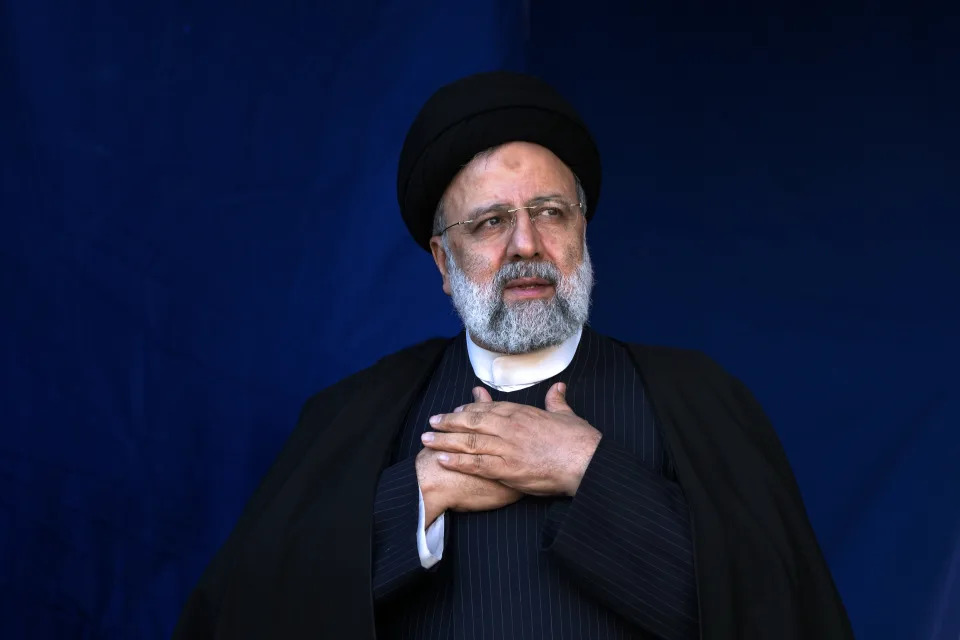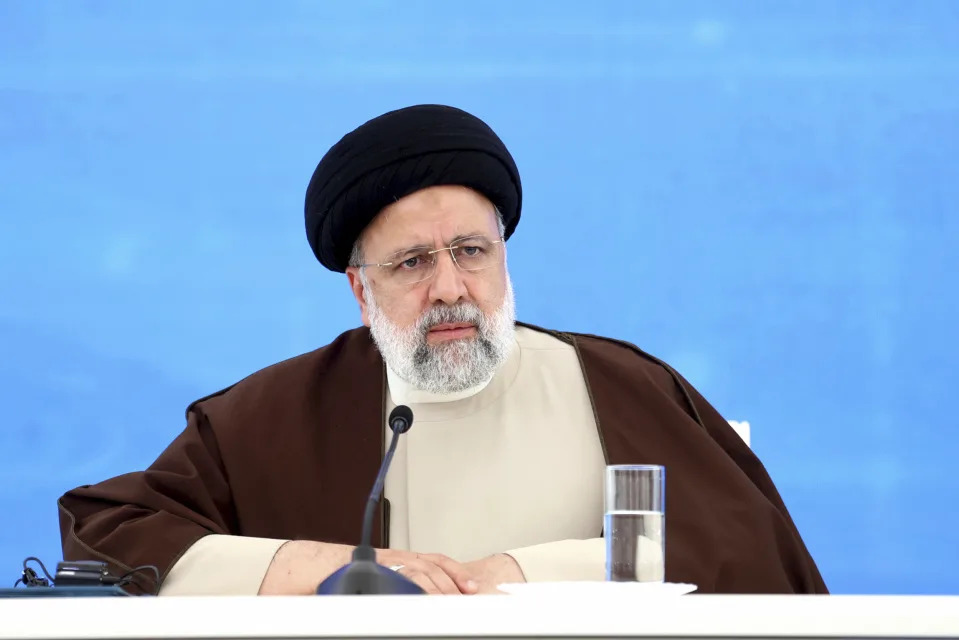Iranian President Ebrahim Raisi places his hands on his heart as a gesture of respect to the crowd during the funeral ceremony of the victims of Wednesday's bomb explosion in the city of Kerman about 510 miles (820 kms) southeast of the capital Tehran, Iran, Jan. 5, 2024. A helicopter carrying Iranian President Ebrahim Raisi suffered a “hard landing” on Sunday, May 19, 2024, Iranian state television reported, without immediately elaborating.
A helicopter carrying Iranian President Ebrahim Raisi, the country's foreign minister and other officials apparently crashed in the mountainous northwest reaches of Iran on Sunday, sparking a massive rescue operation in a fog-shrouded forest as the public was urged to pray.
The likely crash came as Iran under Raisi and Supreme Leader Ayatollah Ali Khamenei launched an unprecedented drone-and-missile attack on Israel last month and has enriched uranium closer than ever to weapons-grade levels.
Iran has also faced years of mass protests against its Shiite theocracy over an ailing economy and women’s rights — making the moment that much more sensitive for Tehran and the future of the country as the Israel-Hamas war inflames the wider Middle East.
Raisi was traveling in Iran’s East Azerbaijan province. State TV said what it called a “hard landing” happened near Jolfa, a city on the border with the nation of Azerbaijan, some 600 kilometers (375 miles) northwest of the Iranian capital, Tehran. Later, state TV put it farther east near the village of Uzi, but details remained contradictory.
Traveling with Raisi were Iran's Foreign Minister Hossein Amirabdollahian, the governor of Iran's East Azerbaijan province and other officials and bodyguards, the state-run IRNA news agency reported. One local government official used the word “crash," but others referred to either a “hard landing” or an “incident.”
Get AfriPrime Android Web View app....Click the link to Amazon app store to download https://rb.gy/3xek46
Neither IRNA nor state TV offered any information on Raisi’s condition in the hours afterward. However, hard-liners urged the public to pray for him. State TV later aired images of the faithful praying at Imam Reza Shrine in the city of Mashhad, one of Shiite Islam's holiest sites, as well as in Qom and other locations across the country. State television's main channel aired the prayers nonstop.
“The esteemed president and company were on their way back aboard some helicopters and one of the helicopters was forced to make a hard landing due to the bad weather and fog," Interior Minister Ahmad Vahidi said in comments aired on state TV. "Various rescue teams are on their way to the region but because of the poor weather and fogginess it might take time for them to reach the helicopter.”
IRNA called the area a “forest” and the region is known to be mountainous as well. State TV aired images of SUVs racing through a wooded area and said they were being hampered by poor weather conditions, including heavy rain and wind.
A rescue helicopter tried to reach the area where authorities believe Raisi's helicopter was, but it couldn't land due to heavy mist, emergency services spokesman Babak Yektaparast told IRNA.
Long after the sun set, Iranian government spokesman Ali Bahadori Jahromi acknowledged that “we are experiencing difficult and complicated conditions” in the search.
“It is the right of the people and the media to be aware of the latest news about the president’s helicopter accident, but considering the coordinates of the incident site and the weather conditions, there is ‘no’ new news whatsoever until now,” he wrote on the social platform X. “In these moments, patience, prayer and trust in relief groups are the way forward.”
Khamenei himself also urged the public to pray.
“We hope that God the Almighty returns the dear president and his colleagues in full health to the arms of the nation," Khamenei said, drawing an “amen” from the audience he was addressing.
Raisi, 63, a hard-liner who formerly led the country’s judiciary, is viewed as a protégé of Khamenei and some analysts have suggested he could replace the 85-year-old leader after Khamenei's death or resignation from the role.
Raisi had been on the border with Azerbaijan early Sunday to inaugurate a dam with Azerbaijan’s President Ilham Aliyev. The dam is the third one that the two nations built on the Aras River. The visit came despite chilly relations between the two nations, including over a gun attack on Azerbaijan's Embassy in Tehran in 2023, and Azerbaijan's diplomatic relations with Israel, which Iran's Shiite theocracy views as its main enemy in the region.
Iran flies a variety of helicopters in the country, but international sanctions make it difficult to obtain parts for them. Its military air fleet also largely dates back to before the 1979 Islamic Revolution. IRNA published images it described as Raisi taking off in what resembled a Bell helicopter, with a blue-and-white paint scheme previously seen in published photographs.
Raisi won Iran's 2021 presidential election, a vote that saw the lowest turnout in the Islamic Republic’s history. Raisi is sanctioned by the U.S. in part over his involvement in the mass execution of thousands of political prisoners in 1988 at the end of the bloody Iran-Iraq war.
Under Raisi, Iran now enriches uranium at nearly weapons-grade levels and hampers international inspections. Iran has armed Russia in its war on Ukraine, as well as launched a massive drone-and-missile attack on Israel amid its war against Hamas in the Gaza Strip. It also has continued arming proxy groups in the Mideast, like Yemen's Houthi rebels and Lebanon's Hezbollah.
Meanwhile, mass protests in the country have raged for years. The most recent involved the 2022 death of Mahsa Amini, a woman who had been earlier detained over allegedly not wearing a hijab, or headscarf, to the liking of authorities. The monthslong security crackdown that followed the demonstrations killed more than 500 people and saw over 22,000 detained.
In March, a United Nations investigative panel found that Iran was responsible for the “physical violence” that led to Amini’s death.
President Joe Biden was briefed by aides on the Iran crash, but administration officials have not learned much more than what is being reported publicly by Iran state media, said a senior administration official, who was not authorized to comment publicly and spoke on condition of anonymity.
Get AfriPrime Android Web View app....Click the link to Amazon app store to download https://rb.gy/3xek46
Who is Ebrahim Raisi, Iran's president whose helicopter suffered a 'hard landing' in foggy weather?
Iran's hard-line President Ebrahim Raisi has long been seen as a protégé to Iran's supreme leader and a potential successor for his position within the country's Shiite theocracy.
News of his helicopter making what state media described as a “hard landing” on Sunday immediately brought new attention to the leader, who already faces sanctions from the U.S. and other nations over his involvement in the mass execution of prisoners in 1988.
Raisi, 63, previously ran Iran's judiciary. He ran unsuccessfully for president in 2017 against Hassan Rouhani, the relatively moderate cleric who as president reached Tehran's 2015 nuclear deal with world powers.
In 2021, Raisi ran again in an election that saw all of his potentially prominent opponents barred for running under Iran's vetting system. He swept nearly 62% of the 28.9 million votes, the lowest turnout by percentage in the Islamic Republic’s history. Millions stayed home and others voided ballots.
Raisi was defiant when asked at a news conference after his election about the 1988 executions, which saw sham retrials of political prisoners, militants and others that would become known as “death commissions” at the end of the bloody Iran-Iraq war.
After Iran’s then-Supreme Leader Ayatollah Ruhollah Khomeini accepted a U.N.-brokered cease-fire, members of the Iranian opposition group Mujahedeen-e-Khalq, heavily armed by Saddam Hussein, stormed across the Iranian border from Iraq in a surprise attack. Iran blunted their assault.
Get AfriPrime Android Web View app....Click the link to Amazon app store to download https://rb.gy/3xek46
The trials began around that time, with defendants asked to identify themselves. Those who responded “mujahedeen” were sent to their deaths, while others were questioned about their willingness to “clear minefields for the army of the Islamic Republic,” according to a 1990 Amnesty International report. International rights groups estimate that as many as 5,000 people were executed. Raisi served on the commissions.
The U.S. Treasury in 2019 sanctioned Raisi “for his administrative oversight over the executions of individuals who were juveniles at the time of their crime and the torture and other cruel, inhuman, or degrading treatment or punishment of prisoners in Iran, including amputations.” It also mentioned his involvement in the 1988 executions.
Iran ultimately is run by its 85-year-old supreme leader, Ayatollah Ali Khamenei. But as president, Raisi supported the country's enrichment of uranium up to near-weapons-grade levels, as well as it hampering international inspectors as part of its confrontation with the West.
Raisi also supported attacking Israel in a massive assault in April that saw over 300 drones and missiles fired at the country in response for a suspected Israeli attack that killed Iranian generals at the country's embassy compound in Damascus, Syria — itself a widening of a yearslong shadow war between the two countries.
He also supported the country's security services as they cracked down on all dissent, including in the aftermath of the 2022 death of Mahsa Amini and the nationwide protests that followed.
The monthslong security crackdown killed more than 500 people and saw over 22,000 detained. In March, a United Nations investigative panel found that Iran was responsible for the “physical violence” that led to Amini's death after her arrest for not wearing a hijab, or headscarf, to the liking of authorities.
Get AfriPrime Android Web View app....Click the link to Amazon app store to download https://rb.gy/3xek46




